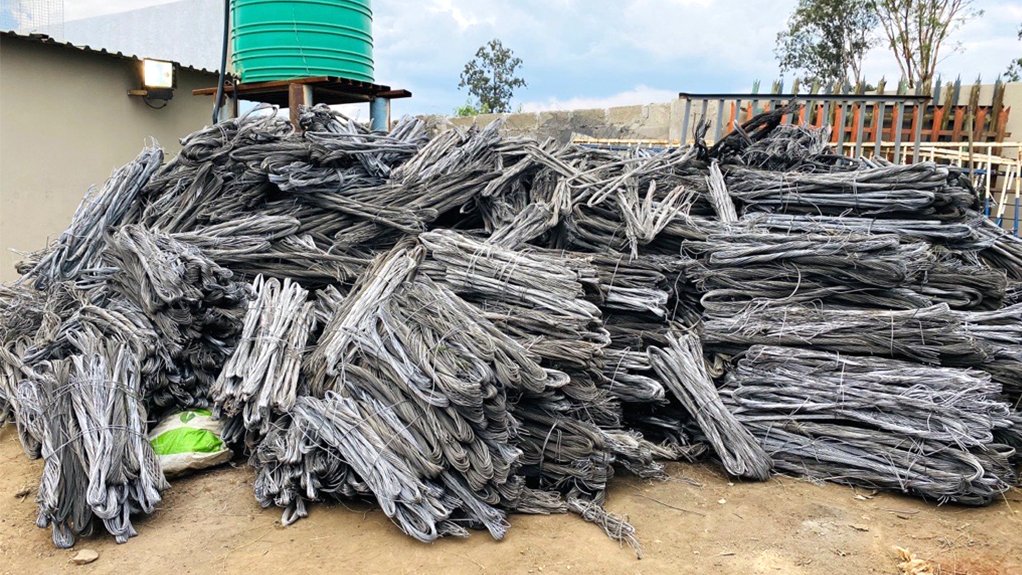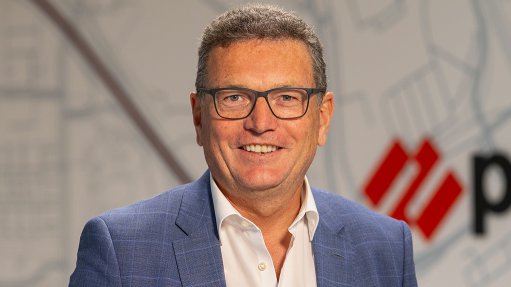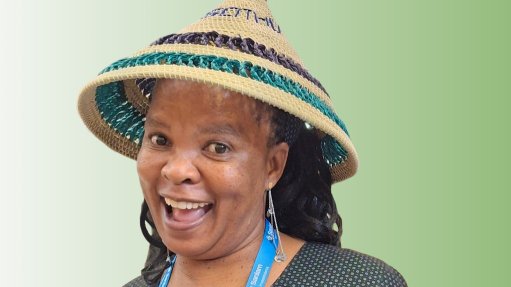PRASA, Transnet welcome six-month ban on scrap metal trading
State-owned rail companies the Passenger Rail Agency of South Africa (PRASA) and Transnet Freight Rail (TFR) have both welcomed the six-month ban on the trade of scrap metal as government seeks to limit damage to infrastructure and the economy.
As of December 2, the export of scrap metal will be banned for six months while government finalises a more permanent legislative solution.
“Theft of cables and metals have badly damaged our network. It is more than theft, it is sabotage of economic infrastructure,” PRASA acting group CEO Hishaam Emeran said this week.
TFR agreed that the “scourge” of metal theft affected not just rail operators but the nation as a whole by undermining the economy, which relies on the rail network to facilitate the transport of bulk commodities such as coal and iron-ore, besides others.
TFR owns 30 400 km of rail track and theft and vandalism of the infrastructure results in delays on the system and possible derailments.
“TFR has long viewed this as economic sabotage,” the freight rail operator said in a statement.
Since April 1, TFR has had to cancel more than 377 export coal trains – an average of 11 a week – because of security incidents. While this was an improvement compared with the 2021/22 financial year, TFR said the security solution was not sustainable.
In the first eight months of the current financial year, TFR lost 742 km of cable nationally.
In solidarity with TFR, PRASA said it believed the ban on trade in scrap metal would make it more difficult for thieves to ransack rail assets.
“We have beefed up our security, introducing military-grade fencing to protect our most valuable assets. Since we implemented the integrated security plan, the asset-related crimes have dropped significantly. But it is not economically feasible to fence our entire network, and this policy change on the trade of waste scrap and semi-processed metals will assist our efforts,” Emeran added.
TFR has received assistance from coal customers towards funding security on the North corridor from Ermelo to Richards Bay, enabling the company to deploy additional security task teams and drones. As a result, there has been a 30% reduction in security incidents on its network.
However, TFR said the reduction of security incidents had not been enough to completely reduce the impact on train cancellations.
PRASA and TFR both said they supported the measures to restrict and regulate trade in waste, scrap and semi-finished ferrous and nonferrous metal products, stating that the six-month ban on export and the tightening of trade regulations would go a long way in reversing copper theft and would scupper the demand for scrap metal, since assets stolen from both PRASA and TFR have ended up at scrap metal yards where they are processed and sold.
The cost of cable theft and vandalism experienced on South Africa’s rail networks can be quantified in terms of both direct and indirect costs associated with the theft and vandalism.
Cable theft and the vandalisation of substations and signalling equipment results in the direct cost of repairing, replacing, and protecting the equipment. It also results in delayed or cancelled trips and subsequent lost revenue – for rail operators and for businesses who depend on them.
Emeran said the implementation of the new policy to restrict and regulate trade in scrap metals would have a positive impact on the economy, as it would bolster PRASA’s ability to provide safe, reliable, affordable, efficient passenger train services. The same is true for TFR.
“The theft of metal and copper cables sold to the industry has had a debilitating impact on PRASA. This has necessitated a programme to rebuild and recover corridors damaged as a result of this theft and vandalism,” he said.
PRASA and TFR are not alone in experiencing wholesale theft of infrastructure. Other State-owned entities such as Telkom and Eskom have also seen their networks targeted by thieves, many of them who are highly organised and who make off with substations, railway tracks, cables and other metals.
PRASA believed that, without this new restrictive policy, the trade in stolen cable and metal would continue and place an unbearable burden on the organisation – and other State-owned entities – to secure infrastructure.
“We welcome assurances by Police Minister Bheki Cele that government will strengthen law enforcement around stolen assets. Stronger policing will help curb theft of our railway infrastructure. Our focus should be on running passenger trains, not spending billions to protect our network,” PRASA chairperson Leonard Ramatlakane said.
TFR also said the announcement by government would go a long way to mitigate the security challenges experienced by the rail industry, adding that it looked forward to government’s finalisation of a more permanent legislative solution to curb cable theft.
“We support this policy wholeheartedly as it will significantly boost our ability to run our trains and protect our infrastructure,” Ramatlakane said.
Article Enquiry
Email Article
Save Article
Feedback
To advertise email advertising@creamermedia.co.za or click here
Press Office
Announcements
What's On
Subscribe to improve your user experience...
Option 1 (equivalent of R125 a month):
Receive a weekly copy of Creamer Media's Engineering News & Mining Weekly magazine
(print copy for those in South Africa and e-magazine for those outside of South Africa)
Receive daily email newsletters
Access to full search results
Access archive of magazine back copies
Access to Projects in Progress
Access to ONE Research Report of your choice in PDF format
Option 2 (equivalent of R375 a month):
All benefits from Option 1
PLUS
Access to Creamer Media's Research Channel Africa for ALL Research Reports, in PDF format, on various industrial and mining sectors
including Electricity; Water; Energy Transition; Hydrogen; Roads, Rail and Ports; Coal; Gold; Platinum; Battery Metals; etc.
Already a subscriber?
Forgotten your password?
Receive weekly copy of Creamer Media's Engineering News & Mining Weekly magazine (print copy for those in South Africa and e-magazine for those outside of South Africa)
➕
Recieve daily email newsletters
➕
Access to full search results
➕
Access archive of magazine back copies
➕
Access to Projects in Progress
➕
Access to ONE Research Report of your choice in PDF format
RESEARCH CHANNEL AFRICA
R4500 (equivalent of R375 a month)
SUBSCRIBEAll benefits from Option 1
➕
Access to Creamer Media's Research Channel Africa for ALL Research Reports on various industrial and mining sectors, in PDF format, including on:
Electricity
➕
Water
➕
Energy Transition
➕
Hydrogen
➕
Roads, Rail and Ports
➕
Coal
➕
Gold
➕
Platinum
➕
Battery Metals
➕
etc.
Receive all benefits from Option 1 or Option 2 delivered to numerous people at your company
➕
Multiple User names and Passwords for simultaneous log-ins
➕
Intranet integration access to all in your organisation




















